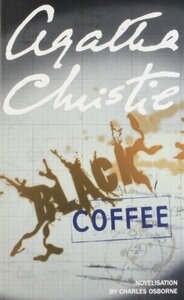Take a photo of a barcode or cover
A poor bastardization of actual Christie; reads like parody. I'm sure the original play is delightful, but this novelization is very poorly done.
mysterious
fast-paced
There’s something inherently satisfying about a murder being served with a cup of coffee—especially when said coffee is laced with poison, and the world’s most fastidious detective is called in to sort out the mess. Black Coffee: A Mystery Play in Three Acts is Agatha Christie’s first original play, and it brews up all the classic Agatha Christie elements you’d expect—brilliant twists, brilliant moustaches, and an alarming number of people hanging around waiting to be accused.
The premise? A physicist, Sir Claud Herbert Amory, has developed a formula for an atomic bomb—casual—and promptly gets bumped off before he can lock it up. Enter Monsieur Hercule Poirot, stage left, complete with his immaculate grooming and infallible little grey cells. The plot thickens faster than over-steeped Earl Grey, and naturally, everyone’s got something to hide.
Reading this as a play was surprisingly delightful. Agatha Christie’s always been heavy on dialogue, so it doesn’t feel like a jarring shift—if anything, it tightens the pace and sharpens the wit. The Hercule Poirot-Captain Arthur J. M. Hastings dynamic is as charming as ever, though it’s a bit odd not to have Arthur J. M. Hastings narrating the whole affair in his usual slightly bumbling, deeply endearing style. Still, he’s present and full of good intentions, and Hercule Poirot continues to outpace him (and everyone else) by several mental miles.
The writing is sharp, the red herrings are plentiful, and the ending had me grinning like a suspect with a secret. Is it Agatha Christie’s most complex or ground-breaking work? Not quite. But as a piece of theatre and a classic whodunnit, it delivers exactly what you came for: a tightly wound mystery, a cast full of shady suspects, and Hercule Poirot preening over his superior intellect. Oh, and bonus points for the eerie prescience of the atomic bomb plot—written fifteen years before Hiroshima.
The premise? A physicist, Sir Claud Herbert Amory, has developed a formula for an atomic bomb—casual—and promptly gets bumped off before he can lock it up. Enter Monsieur Hercule Poirot, stage left, complete with his immaculate grooming and infallible little grey cells. The plot thickens faster than over-steeped Earl Grey, and naturally, everyone’s got something to hide.
Reading this as a play was surprisingly delightful. Agatha Christie’s always been heavy on dialogue, so it doesn’t feel like a jarring shift—if anything, it tightens the pace and sharpens the wit. The Hercule Poirot-Captain Arthur J. M. Hastings dynamic is as charming as ever, though it’s a bit odd not to have Arthur J. M. Hastings narrating the whole affair in his usual slightly bumbling, deeply endearing style. Still, he’s present and full of good intentions, and Hercule Poirot continues to outpace him (and everyone else) by several mental miles.
The writing is sharp, the red herrings are plentiful, and the ending had me grinning like a suspect with a secret. Is it Agatha Christie’s most complex or ground-breaking work? Not quite. But as a piece of theatre and a classic whodunnit, it delivers exactly what you came for: a tightly wound mystery, a cast full of shady suspects, and Hercule Poirot preening over his superior intellect. Oh, and bonus points for the eerie prescience of the atomic bomb plot—written fifteen years before Hiroshima.
mysterious
medium-paced
Plot or Character Driven:
Character
Strong character development:
Complicated
Loveable characters:
Yes
Diverse cast of characters:
Yes
Flaws of characters a main focus:
No
challenging
mysterious
medium-paced
Plot or Character Driven:
Plot
Strong character development:
N/A
Loveable characters:
N/A
Diverse cast of characters:
No
Flaws of characters a main focus:
Yes
Written in 3rd person. The case where Sir Claud, a scientist, discovers a formula for a new type of explosive, and summons Poirot in fear of it being stolen by a member of his household. Before Poirot can arrive, the formula is stolen, and Claud is murdered.
mysterious
medium-paced
Plot or Character Driven:
Plot
Strong character development:
No
Loveable characters:
Complicated
Diverse cast of characters:
No
Flaws of characters a main focus:
No
I enjoyed this Agatha Christie plot a lot - it was one where I actually thought I might have the right guess as to the murderer, yet in the end I was mistaken. I did not like the characterizations of Poirot and especially of Hastings (for someone who is there the whole time, Hastings is surprisingly lacking in any actions or even much words). It was clear that someone else had written this. I guess what I'm saying is that I liked Christie's plot but felt Osborne's writing strayed too far from Christie's for a book that is supposed to be adapted from her play. I still enjoyed this book, but I would have enjoyed it more had it been written by Christie herself.
adventurous
mysterious
tense
slow-paced
Plot or Character Driven:
Plot
Strong character development:
No
Loveable characters:
Yes
Diverse cast of characters:
No
Flaws of characters a main focus:
No





